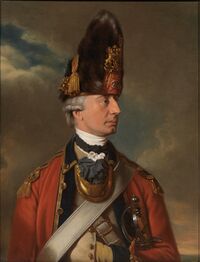Biography:Cosmo Gordon
Cosmo Gordon
| |
|---|---|
| Given name: | Cosmo |
| Middle name: | |
| Family name: | Gordon |
| Place of birth: | |
| Place of death: | |
| Year of birth: | c, 1737 |
| Year of death: | 1813 |
| Profile: | Musician |
| Source of information: | |
Biographical notes
THE HONORABLE COSMO GORDON was born about 1737, the fourth son of William Gordon, 2nd Earl of Aberdeen. The Gordons were a powerful Scots family, and not only was Cosmo's father a Gordon, but his mother as well. She was Lady Anne, the daughter of Gen. Alexander Gordon, 2nd Duke of Gordon. As the younger son of an Earl Cosmo was unlikely to inherit, and, as with many such younger sons, he purchased a commission, choosing the prestigious 3rd Regiment of Foot Guards, known as the Scots Guards. He was entitled, as the son of an Earl, to the honorific 'The Honourable', which he used in addition to his military rank. Gordon joined the Brigade of Guards at its winter quarters in Philadelphia in 1778, and was placed in command of the 2nd Company of the 1st Battalion. Later he fought in the Battle of Monmouth (New Jersey). However, Gordon’s leadership skills were questionable and his subordinates treated him with personal loathing and a disrespect. It came to a head when during a probe into the New Jersey hills, when Gordon could not be found during the action to brush the Continental militia from Elizabethtown and environs. He was ostensibly directing artillery fire, but left his subordinates without orders. They took the initiative themselves, all the while complaining. This went on for some time after the war, the chief complainant being Welshman Lt. Col. Frederick Thomas.
After two court martials (one of Thomas and one of Gordon), the army declined to censure either man. Unsatisfied, Gordon pursued a personal duel, calling out Thomas three times before obtaining an agreement in 1783 to meet early in the morning at Hyde Park. Thomas's ball struck Gordon, but did not penetrate his body (though causing a painful contusion), while Gordon's ball entered Thomas's solar plexus, a mortal wound. Dueling being against the law, Gordon was obliged to flee to Calais for a year, and on his return was tried for murder and acquitted, after a parade of prominent and noble character witnesses testified to his character. He resigned his commission and retired to the life of a cultured gentleman, dabbling in music, touring Italy and attending the races. He died, unmarried, in 1813, and left his estate to his nephews.
